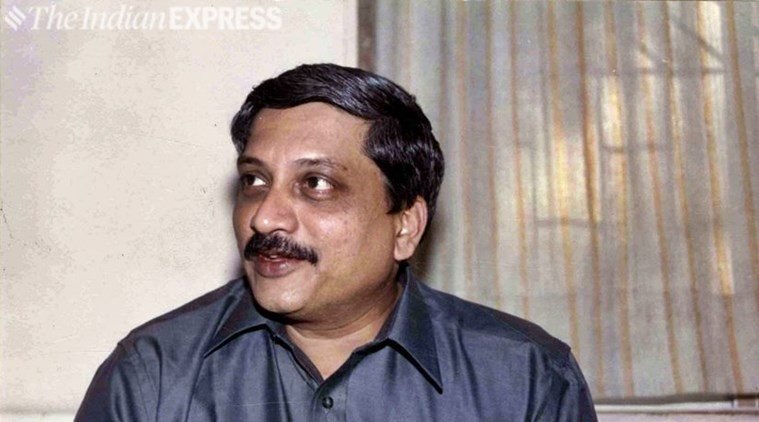
|
Getting your Trinity Audio player ready...
|
Manohar Parrikar’s greatest strength lay in his simplicity and transparency, and his reticent nature — not the positions he occupied or the policies he framed.
Sometime in the early 2000s, I visited Goa in connection with some RSS work. A meeting with the state’s chief minister was arranged at his residence in the morning before he began his official work. I was at the CM’s residence by about 8.30 am. After a few minutes, I found Parrikar, the then CM of Goa, driving in in his personal car, a Maruti Zen, if I remember correctly. A bit surprised, I asked him if there was no driver available that morning. The CM replied in a very matter-of-fact way that he uses his personal car every morning to drop his children to school. He used the services of the government driver only for going to the Secretariat later in the morning.
What is integrity after all? It is about “choosing courage of conviction over comfort, choosing what is right over what is fun, fast or easy and, most importantly, choosing to practise values rather than simply professing them”. Parrikar lived a life of integrity. He never spoke about it or showed off.
He was not a great communicator. The longest speeches he delivered would have been about 20-30 minutes long. But his popularity had no limits. He was the glue that kept the BJP and the government in Goa going. Everyone surrendered before his exemplary personality.
A swayamsevak of the RSS since childhood, Parrikar personified quintessential RSS-ness: He was disciplined, unassuming, transparent and courageous. Those who have seen him from the days when he was the sanghachalak, local head of the Goa RSS, vouch for the fact that he remained unchanged through his political journey. Power and position didn’t change him. He was dedicated to his job, but detached from its aura.
Parrikar, who graduated from IIT Bombay in 1978, could have opted for a well-paying career abroad. Instead, he returned to his native town of Mapusa in Goa and got into a small manufacturing business. He became the sanghachalak of the Goa unit of the RSS at the relatively young age of 26. It was during the Ram Janmabhoomi movement that I had first heard of this well-educated young leader of the RSS.
When the BJP decided to expand its influence in the erstwhile Portuguese colony, in whose struggle for liberation many RSS volunteers had actively participated in, the party commissioned several functionaries of the RSS, including Parrikar, to work for it. Thus started Parrikar’s political innings.
In his political career of 25 years, Parrikar held several important and prestigious posts. He became the chief minister of the state three times — first in year 2000, then in 2012 and finally in 2017. He had made a special place for himself in Goa politics, which had seen many ups and downs since the BJP started challenging the hegemony of the Congress. It would not be an exaggeration to say that in the last two decades, politics in Goa revolved round Parrikar. Whether in power or out of it, whether he was in Goa or in Delhi, Parrikar would control the state’s politics. “You may take me out of Goa but you cannot take Goa out of me,” he used to say.
After the BJP’s victory in the 2014 parliamentary elections, some of us who had known Parrikar well felt he should now move to Delhi and play a bigger role at the Centre. Incidentally, the BJP had announced the candidature of Narendra Modi for prime ministership at its conclave in Goa in 2013 and Parrikar, who was the state’s chief minister at that time, played an important role in the making of that decision. Naturally, Prime Minister Modi liked our idea and sent word to Parrikar in November 2014 to join his cabinet.
Parrikar held the defence minister’s portfolio in Modi’s government for almost two-and-a- half years. One challenge that he tackled deftly was the One Rank One Pension (OROP) issue. As defence minister, he allowed direct access to the chiefs of the armed forces to his office and ran the ministry hands on.
Parrikar’s forthrightness dragged him into controversies occasionally. His views on Pakistan and his opinion on the no-first-use nuclear doctrine became debating issues in TV studios. But nobody ever disrespected or derided him. Everyone knew that his opinions were borne out of genuine beliefs.
His greatest strength lay in his simplicity and transparency, and his reticent nature — not the positions he occupied or the policies he framed. He would always be seen in his sandals and half-sleeved shirt, even at official events. People remember that he walked alone to the hotel after the BJP’s victory in the Goa assembly elections in 2012, only to be anointed as the state’s chief minister a few minutes later. Many will remember Parrikar sitting next to them in the economy class of flights. People also can’t forget images of him delivering the budget speech a couple of months ago, with an oxygen tube attached to his nose. Such was his dedication to the people of Goa.
Goa occupied the central space in his thinking and action at all times. He wanted the small state to not just remain a pleasure destination or a hub of film festivals. He suggested that the state be a destination for intellectual activity as well. He encouraged us to hold the annual Ideas Conclave of the India Foundation at Goa. He was keen that Goa should enter into a sister-state agreement with Hawaii in the US and develop maritime institutions in collaboration with the ones in Hawaii. In fact, everything had been worked out and the signing of the agreement awaited his travel to Honolulu.
He did travel to the US in February, only to bring us the bad news of advanced cancer. Parrikar did his best for Goa and the country. The only thing he probably missed was the desire to be an ordinary citizen again, in the last 10 years of his life. Providence wanted him to go as a working, not retired, man.
(The article was originally published in Indian Express on March 19, 2019. Views expressed are personal)



